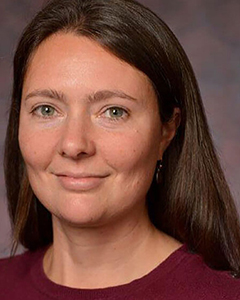March 25, 2024

Researchers from NIEHS Environmental Health Sciences (EHS) Core Centers stood out at the 2024 Society of Toxicology (SOT) conference, held March 10-14 in Salt Lake City, Utah.
Scientists from five centers received awards at the conference to honor their individual contributions in toxicology research, training, and education. In addition, many EHS Core Center trainees were recognized for their achievements at the meeting.
Center researchers also moved beyond podiums and posters to share their research in the SOT TV 2024 video series.
Meet the Awardees

Nathan Cherrington, Ph.D., (left) and Dean Billheimer, Ph.D., (right) were part of the research team that won the 2024 Toxicological Sciences Paper of the Year Award. Cherrington and Billheimer are the director and deputy director, respectively, of the EHS Core Center at University of Arizona (UArizona).
Their study revealed unique gene and protein expression patterns in kidney samples from patients with liver disease, providing insight into how chronic liver disease affects kidney function.
Cherrington credited the UArizona Core Center’s Omics Facility Core for conducting the gene and protein expression analyses and the Translational Research Support Core for helping the team better interpret the data linking liver inflammation and kidney dysfunction.

Dave Eaton, Ph.D., who directed the University of Washington (UW) EHS Core Center from 1995-2013, was presented with the 2024 SOT Merit Award. This award recognizes an SOT member who has made distinguished contributions to toxicology throughout their entire career in areas such as research, teaching, regulatory activities, consulting, and service to the Society.
Eaton’s research provided insight into how dietary exposure to fungal toxins can lead to cancer. Additionally, his contributions to the development of organ-on-a-chip models have revolutionized toxicology testing.
Eaton has also volunteered for many scientific and government organizations. For example, he served on the NIEHS Advisory Council from 2013–2017 and the Board of Scientific Councilors for the National Toxicology Program from 2019–2022.

Ilona Jaspers, Ph.D., a member of the EHS Core Center at the University of North Carolina at Chapel Hill, was presented with the 2024 SOT Education Award. She was acknowledged for her progressive vision and exceptional leadership in the education and development of the next generation of toxicologists. In addition to the direct impact she has had on the education and career success of her trainees, Jaspers was also recognized for the personal connections, emotional support, and focus on inclusionary science she brings to her students’ education.

Phoebe Stapleton, Ph.D., of the Rutgers University EHS Core Center, received the 2024 SOT Achievement Award. This award recognizes an SOT member who has made significant contributions to toxicology within 15 years of obtaining their doctoral degree. A leader in reproductive toxicology, Stapleton was acknowledged for her innovative research which has improved our understanding of how exposure to nanomaterials during pregnancy may impair blood flow to the developing fetus.

Hollie Swanson, Ph.D., was bestowed the 2024 SOT Undergraduate Educator Award. A member of the University of Kentucky EHS Core Center, Swanson was recognized for her significant contributions to the introduction and instruction of toxicological topics to undergraduate students. As an educator, Swanson teaches a variety of undergraduate courses on toxicology. She is also a frequent publisher and presenter on classroom teaching approaches.
Video Vignettes
Center members from across the country sat down with SOT TV 2024 to talk toxicology. Although the EHS Core Center program supports these scientists’ work, the efforts below represent their individual research endeavors.
- Julia Cui, Ph.D., discussed her lab’s research to understand how the microbiome may modulate the body's response to chemical exposures. Cui is director of the UW Core Center’s Genomics, Functional Genomics, Proteomics, Metabolomics Facility Core.
- Stapleton sat down with SOT TV to discuss her research to understand how micro- and nanoplastics inhaled during pregnancy can affect fetal and child development.
- John Pierce Wise, Sr., Ph.D., described his One Environmental Health research approach, which focuses on studying how toxic chemicals affect human health, animal health, and ecosystem health. Wise, a member of the EHS Core Center at the University of Louisville, uses cell lines from whales, alligators, sea lions, and sea turtles to better understand how metal exposures may lead to cancer across species.
- Several members of the EHS Core Center at the University of Southern California provided an in-depth look into the Center’s efforts to explore how exposure to environmental factors such as air pollution, metals, and social factors contribute to a range of adverse health outcomes. Through a combination of human population studies, experimental model systems, and omics technologies, the Center embodies a multidisciplinary approach to environmental health science research. Center members also collaborate with local communities affected by environmental health issues, and partner with government agencies, nonprofit organizations, and community leaders to develop solutions that will protect public health.
- Leaders from the EHS Core Center at Mount Sinani provided an overview of how they are using an exposomic approach to unravel the complex interactions between the environment and health. In the video, they emphasize the critical importance of a multidisciplinary approach to bridge the gap between scientific discovery and policy-driven solutions. Their work is guided by a commitment to community engagement.


